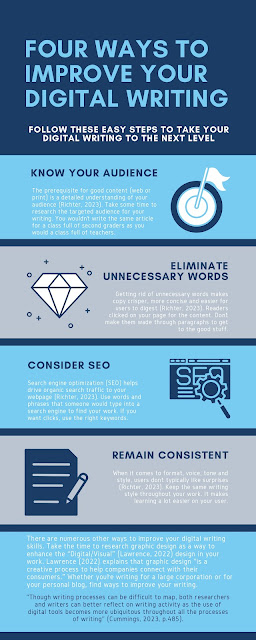Improve Your Content With Better Digital Writing
In my previous post, I wrote about upping your digital writing skills to standout. Standing out in a vast pool of applicants is tough, but having skills that employers are desperately looking for can help. I wrote, (Beard, 2024) being a proficient writer is a skill employers desire in their employees and could make you a hot commodity on the job market. As Lawrence (2022) states, "Candidates with strong digital skills listed on a resume may stand out amongst competitors as having a technical edge or skill-based advantage." Don't think employers place an emphasis on writing skills? Linville (2021) drives this thought home, "A 2019 survey by the National Association of Colleges and Employers found that four out of five employers named 'written communication skills' as the quality they value most in addition to a strong GPA."
In this post, I'm going to continue on the topic of digital writing and list several ways you can improve the content you are creating for your personal pages or the company you work for. While there are numerous ways to improve your digital writing skills, I have focused on four that I think can be the most impactful immediately:
- Know Your Audience- Who are you writing for and what do you want their takeaway to be?
- Eliminate Unnecessary Words- Get to the point and get to it fast.
- Consider SEO- Be sure to use keywords and phrases that will be recognized by search engines.
- Remain Consistent- Keep the same writing style throughout your work.



Until this class I had never considered using words in digital texts that will appear in search engines! Making sure that my posts were the first thing to pop up when someone searched for a topic! Your graphic is wonderful! I look forward to learning more from you and our text!
ReplyDeleteI think your post speaks to the idea that digital writing is not the same as traditional writing. Turner & Hicks (2017) argue that what makes digital writing different is that readers can respond directly and quickly to a digital text, and writers can use more than just words to support their arguments. Even in digital writing there are different formats, as your blog post featuring an infographic proves; this requires a nuanced understanding of how to construct an argument in each one (Turner & Hicks, 2017). Students require specific instruction in order to be able to compose argumentative texts (Kathpalia & See, 2016). I think your post is helpful for recent graduates who are new to the workforce and didn't learn the art of digital writing in school, or for those who simply want to improve their writing.
ReplyDeleteReferences
Kathpalia, S. S., & See, E. K. (2016). Improving Argumentation through Student Blogs. System: An International Journal of Educational Technology and Applied Linguistics, 58, 25–36. https://doi-org.ezproxy.montevallo.edu/10.1016/j.system.2016.03.002
Turner, K.H., & Hicks, T. (2017). Teaching adolescents to read and write digital texts: Argument in the real world. Heinemann.
Mr. Beard,
ReplyDeleteI enjoyed reading your four recommendations to improve digital writing skills. The four points all connect to keeping the reader engaged while consuming your content. I am wondering about your thoughts on how data sources might also contribute to keeping an audience engaged in digital writing. Turner and Hicks (2017) state that when creating infographics, "data must be attributed to a reliable source" (p. 62). I would find this to be true for other forms of digital writing. I would also like to explore the use Search Engine Optimization when creating my own digital writing. I have learned of its effectiveness on digital media, however, I do not have enough practice to feel proficient in that area. I read an article recently that focused on teaching SEO through YouTube video work. Marketing students received explicit instruction on search engine optimization and used YouTube as a tool for applying their knowledge. After analyzing assessment of instruction on SEO, Cowley (2020) found that marketing students were better equipped to generate a larger volume of consumers.
References
Cowley, S. (2020). The youtube seo project: Teaching search engine optimization through video. Marketing Education Review, 30(2), 125-131. https://doi-org.ezproxy.montevallo.edu/10.1080/10528008.2020.1755603
Turner, K. H., & Hicks, T. (2017). Argument in the real world: Teaching adolescents to read and write digital texts. Heinemann.
Comment posted by Tanishia Smith Sims